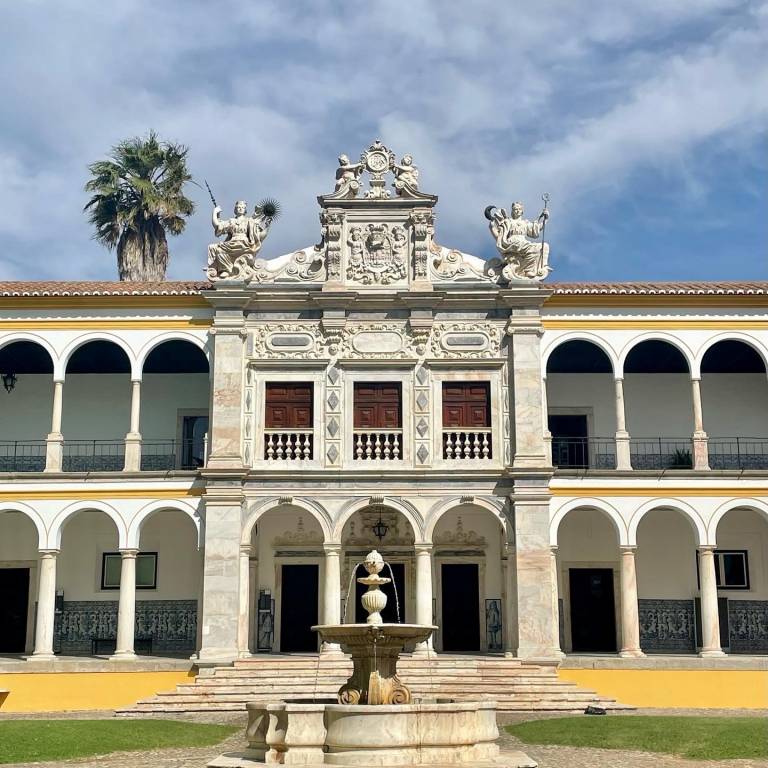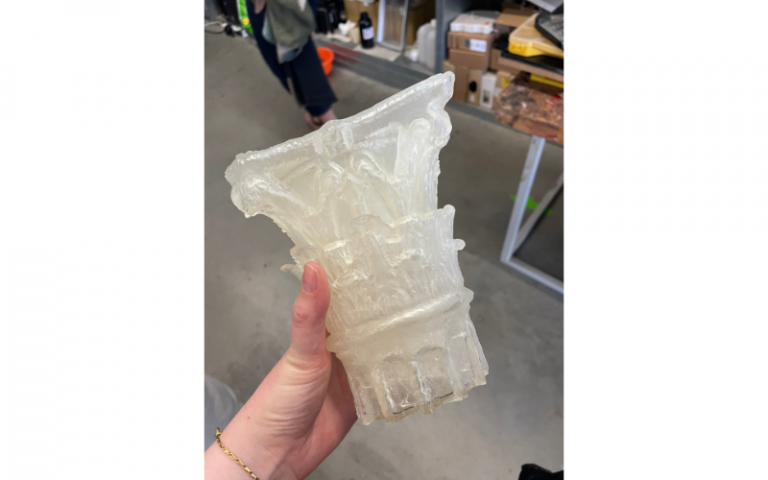Crafting the Past: Materials, Materialities, Materialisms
10 August 2022
Doctoral Workshop and International Conference. IHC/NOVA, the IN2Past Collaborative Laboratory and the Department of History of Art at UCL. 23rd-25th May 2022 Évora, Portugal.

Overview
Between 23rd and 25th May 2022 a delegation of staff and research students from UCL’s History of Art Department visited the University of Évora in Portugal. The group convened for a two-day series of doctoral workshops and seminars organised in collaboration with the Institute of Contemporary History (IHC), part of Lisbon’s NOVA University, and the IN2PAST Collaborative Laboratory. The three institutions came together under the rubric of materiality, a theme which culminated in a public conference, Crafting the Past: Materials, Materialities, Materialisms. The informal and highly interdisciplinary nature of this research event, alongside the generous scope of the theme, allowed for a wide-ranging spectrum of ideas and perspectives to be presented and explored.
Day One: Workshop, Masterclass and Visit to Arteria Lab
Monday 23rd May began with a presentation and workshop on the power of commonality and communality in artistic practice titled, ‘Confined Artistic Practices: Resistance and collectivism in the COVID-19 pandemic in Portugal’ and led by Alexandra do Carmo, Cristina Pratas Cruzeiro and Daniela Salazar. The workshop focused on how museums, archives, cultural institutions, and communal facilities can act as sites for generative, collaborative relations at the intersections of academia, the arts, public policy and domains of cultural heritage and civic memory. An interactive workshop, the group were encouraged to discuss the structures of institutions, barriers to commonality and the potential porosity of those barriers – their materiality and immateriality. This topic saw discussion of language, communication, technology, material (financial) compensation, and how these issues have been called into question during the coronavirus pandemic.
The six doctoral students then had one-to-one feedback sessions on their conference papers with readers from outside their home university. This was followed by a Masterclass about access, inclusion, diversity, equity and cultural participation run by Maria Vlachou, Executive Director of Acesso Culturo. A workshop brought the issue and precedent of protest and controversy into focus. Four cross-institution groups were assigned to explore and present on a number of case studies including the following: the toppling of the Edward Colston statue in Bristol in 2020 by Black Lives Matter protestors; the dissension, calls for removal and destruction of Dana Shutz’ s Open Casket (2016) at the Whitney Biennial in 2017 by Hannah Black and Parker Bright; the whitewashing of poet Walt Whitman’s sexuality by the Walt Whitman Birthplace Historic Site in 2017; and finally, the complexities of acting, dubbing and translating lived experience.
The day concluded with an opportunity to visit the University of Évora’s Arteria Lab, led by Daniela Salazar and PhD student, Natália Melo. The laboratory describes itself as sitting ‘at the crossroads of art, science, design and technology’, enabling the materialisation of ideas through prototyping. Arteria Lab boasts machines which enable 3D scanning, modelling, printing, laser cutting, water jet laser cutting (or Wazer-cutting), vacuum thermos-moulding and plastic recycling. The participants were given a tour of the lab and shown the products of these machines which materialize interdisciplinary projects in recycled plastic, from Corinthian columns for classicists, to fossil remnants for paleontologists.

Day Two: International Conference
On Tuesday 24th May, the international conference, Crafting the Past: Materials, Materialities, Materialisms took place at the University of Évora’s Espírito Santo College. With the aim of promoting further discussion around the topics of the previous day’s workshops, speakers focused on the thematic, epistemological, and methodological intersections of history and history of art as disciplines, in relation to issues of materiality and ethics.
Artist, researcher and curator, Mathieu Abonnenc began the conference with his keynote speech, Toward a Decolonial Ecology? Learning from Wilson Harris's Guyanas. The discussion was chaired by researcher, director, programmer and professor, Raquel Schefer. Through a presentation of his research on the Guyanese author, Wilson Harris, Abonnenc posed pertinent questions about the materiality, nonlinear temporality, and topology of colonial and postcolonial histories. A screening of his 2021 film, Limbé introduced further questions about the role of embodiment in such histories. Throughout his speech, histories of geographical movement were suggested as key sources of shared knowledge and thus, pathways for reconfiguring the landscape of collective history.
Following Abonnenc’s paper, the six participating PhD researchers – three from the IHC/IN2PAST and three from UCL – presented their conference papers in response to the topic of materiality. The first session was chaired by Hélia Marçal. João Luís Sequeira began with his paper, Decolonizing discourses in Portuguese Industrial Archaeology in which he called for further attention to the material interactions and traces of the human body in the archaeology of Portuguese industrial sites. Roz Hayes’ paper, "Look to Your Eating": Animal Matter in C19th Visual Culture shifted focus to the nonhuman and to the instability and degradation of materials – namely, animal gelatine – in the production processes of early photography. Natália Melo then introduced questions about the role of the museum in the historiography of the contemporary. Her paper, Art and science converge into climate museums raised questions about the dissemination of information on the climate crisis via the arts and museums.
The second session, chaired by Rui Lopes, began with Caitrín Barrett-Donlon’s paper, Yvonne Rainer’s ‘AG Indexical, with a little help from H.M.’ which looked to experimental dance to explore questions about the complex materiality of embodiment and bodily interventions in the temporality of history. Further questioning the role of the art museum in knowledge-making, Henrique Entratice’s paper, From Clay to Chaos: itineraries and narratives of a karajá doll sought to rethink the categorisation of materials by collecting institutions and the influence of such categorisation on the material histories of intangible cultural heritages. The final paper of the day, Costume and Viscera: (re)materialising the rationalised woman in Weimar Germany given by Caitlin Powell, offered German artist Hans Bellmer’s Self-portrait with doll (1934) as a site to think through the instability of the material body, as a photograph which troubles the precarious categories of materiality and immateriality, surface and depth, embodiment and disembodiment.
Throughout the day’s proceedings, insightful comments and stimulating questions came from the wider group of participants, among whom were the Department’s Aparna Kumar, Nick Robbins, and Bob Mills and the IHC’s Liliana Coutinho and Ana Bigotte Vieira. Concluding the conference, researcher and former UCL student, Afonso Dias Ramos led a panel discussion alongside organisers, Richard Taws and Catarina Laranjeiro. Ramos’ summary of the papers presented, their relations to one another and to the broader themes of the conference made clear the value and fruitfulness of taking the topic of materiality as a starting point for interdisciplinary discussions. The varied research topics of the papers intersected productively through their attention to the movement, musealisation and precarity of materiality and crucially, put forward important questions about the ways in which we collectively contribute to writing the history of our research materials.
Day Three: Discussion and Conclusions
Wednesday 25th of May saw participants across the three institutions gather to discuss the outcomes of the workshops and conference, draw conclusions and to establish a theme for the next iteration. During the discussion, the exercise of reviewing conference papers with members from outside the participants’ home institutions was emphasised as particularly useful. Participants also agreed that the topic of materiality had proved highly generative and that future iterations of the workshop could certainly build upon the initial rubric to facilitate further interdisciplinary discourse. Above all, however, the unique opportunity to collaborate in person at this research event and to establish professional and personal connections with both staff and students across international institutions was unquestionably valued by all participants.
UCL History of Art's Dr Hélia Marcal was a key organiser for this event. The event received funding from two UCL sources; the Dean’s Strategic Fund and UCL’s Global Engagement Fund.
Images:
- Feature image: University of Évora’s Espírito Santo College, the location of day two of the conference.
- Second image: Object from the Lab from day one of the conference.
 Close
Close

